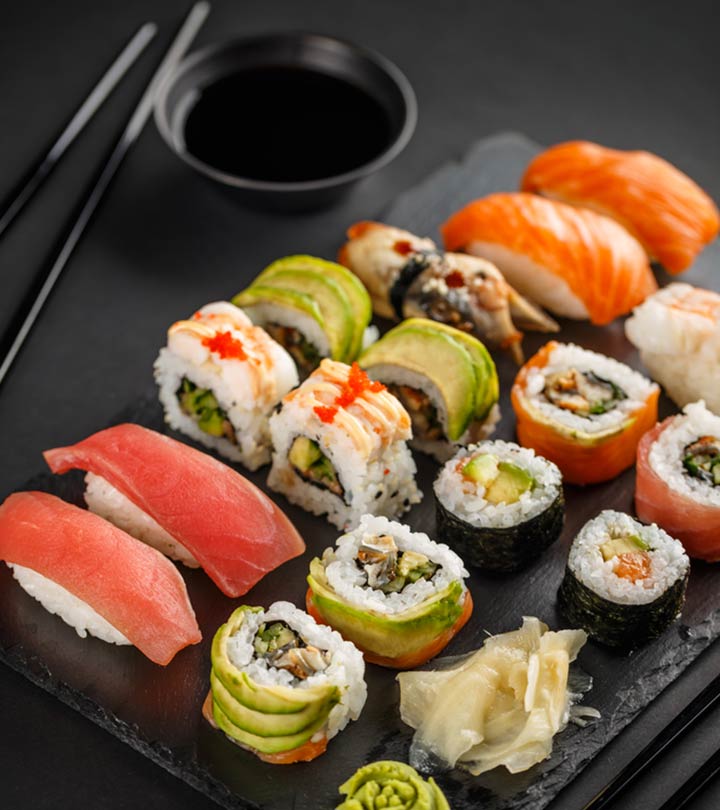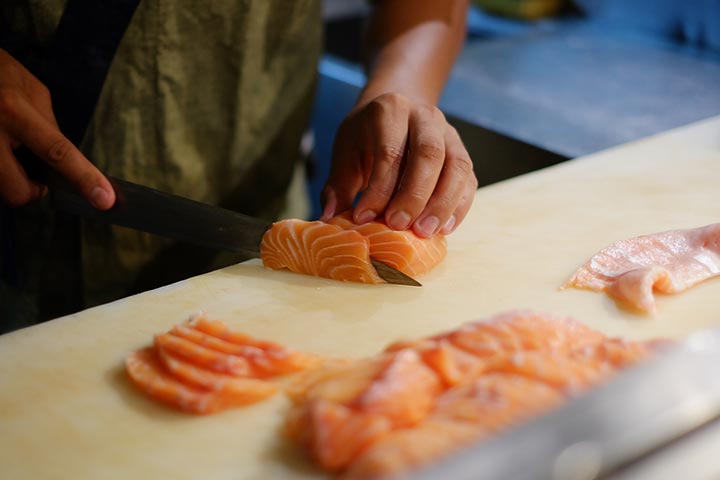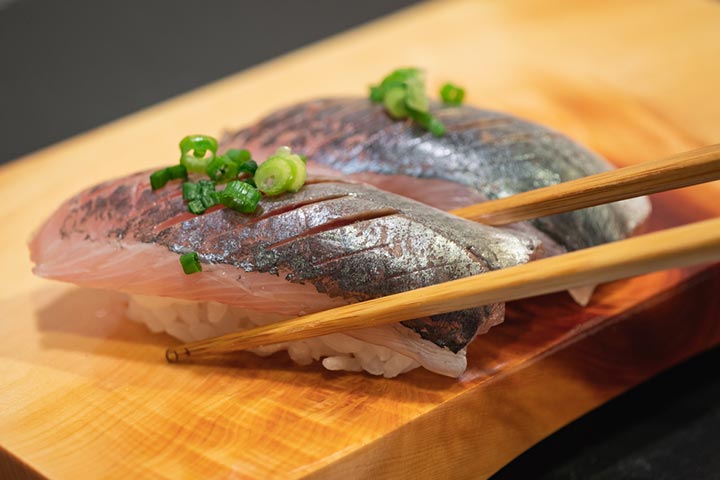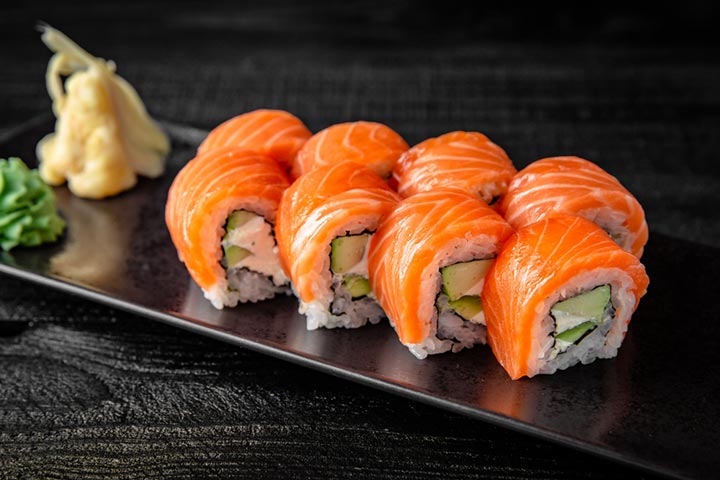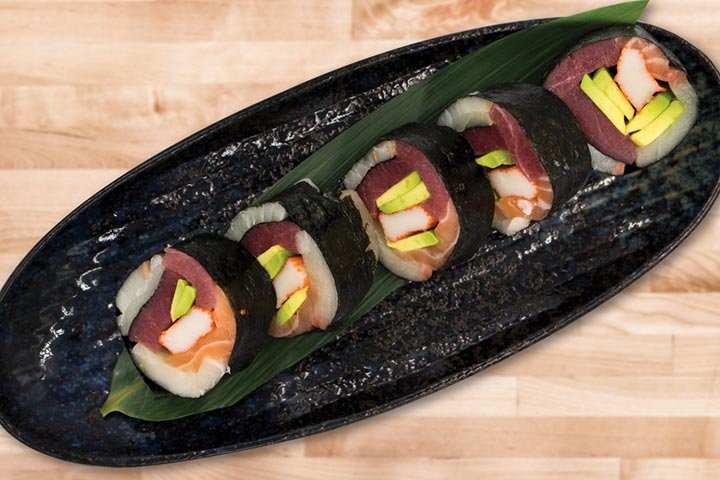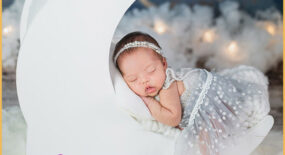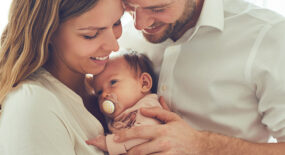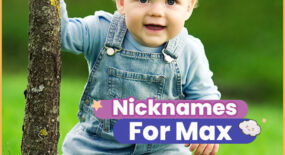New mothers often have concerns about how safe it is to consume sushi while breastfeeding. This staple rice dish of Japanese cuisine is traditionally prepared with cooked rice, vegetables, and delicious seasonings. However, it also includes egg or raw seafood, which may be a cause for concern. In addition, since seafood is often exposed to mercury, it can be harmful to the mother and the baby (1). So, can you eat Sushi while breastfeeding? Let’s find out.
Read this post to learn more about the risks of eating sushi, its alternatives, and some tips on consuming sushi safely while nursing.
Is It Safe To Eat Sushi When Breastfeeding?
Sushi is safe to eat during lactation and breastfeeding unless it is made from fish that have absorbed potentially high levels of mercury (2). Large fish, such as bigeye and yellowtail tuna, swordfish, tilefish and shark are high in mercury and is dangerous for a developing baby.
Post-birth, a mother’s body provides all the nourishment needed for the baby. While fish is a healthy addition to the maternal diet, sushi made of raw seafood might not be good for the baby if it contains high levels of mercury, which may affect the baby’s health. When having fish or any other seafood, breastfeeding women should make sure that they eat high-quality variety with considerably low levels of mercury.
What Are The Benefits Of Consuming Sushi While Breastfeeding?
Eating sushi while breastfeeding could be quite beneficial because of its nutrient-packed ingredients (3).
- A standard sushi dish may include rice, nori, fresh fish, and a mix of veggies such as cucumber, avocado, bell peppers, and carrots. This combination may boost lean protein and nutrients essential for a breastfeeding baby.
- Specialized seaweed, such as nori, used in sushi, is low in calories and rich in minerals, including calcium, magnesium, phosphorus, iron, sodium, and vitamins A, C, and E. Additionally, it may provide the iodine required for proper thyroid functioning. These nutrients are crucial in promoting the healthy growth and development of a nursing infant.
Therefore, consuming properly prepared and thoroughly cooked sushi may positively contribute to the overall health of the breastfeeding woman and her baby.
What Are The Risks Of Eating Sushi When Breastfeeding?
Pregnant women and breastfeeding women should be cautious before having sushi or any other seafood. Most people believe that seafood consumption is potentially a risk for pregnant women and breastfeeding women, as it (1) (4):
- Contains bacteria: Sushi’s main ingredient is raw fish that may carry bacteria. Bacteria is especially risky for pregnant moms as it can affect the unborn baby. When breastfeeding, a bacterial infection could also hamper the mother’s ability to breastfeed her infant.
- Increases exposure to mercury: Some fish contain high mercury levels, and intake of such fish can affect a baby’s brain and nervous system.
- Contains high levels of industrial pollutants:Industrial pollutants containing high levels of germs and bacteria are often dispersed into bodies of water which can in turn contaminate the fish. It is helpful to know where the fish you are eating has been sourced from.
Babies go through phases of rapid development while being breastfed. Therefore, it is better to stay away from food containing mercury when breastfeeding. Not all types of sushi are a risk for breastfeeding women, but you should avoid including sushi constructed from the following fish in your postpartum diet:
- Ahi (yellowfin tuna)
- Aji (horse mackerel)
- Buri (adult yellowtail)
- Hamachi (young yellowtail)
- Inada (very young yellowtail)
- Kanpachi (very young yellowtail)
- Katsuo (bonito)
- Kajiki (swordfish)
- Maguro (bigeye, bluefin or yellowfin tuna)
- Makjiki (blue marlin)
- Meji (young bigeye, bluefin* or yellowfin tuna)
- Saba (mackerel)
- Sawara (Spanish mackerel)
- Shiro (albacore tuna)
- Seigo (young sea bass)
- Suzuki (sea bass)*
- Toro (bigeye, bluefin or yellowfin tuna)
What Are The Alternatives To Sushi?
If you crave sushi during pregnancy or breastfeeding, the safest alternative is to have vegan sushi with fresh ingredients, including avocado, tofu, carrots, and cucumber. You may also prefer to make it fresh at home to safeguard fetal and maternal health. You will need the following ingredients to make vegan sushi (5):
- Short-grain Japanese rice
- Rice vinegar
- Sugar
- Salt
- Nori sheets
- Carrots
- Cucumber
- Avocado
- Firm tofu
- Soy sauce
- Sesame seeds
Which Cooked Fish Is Safe When Breastfeeding?
Most cooked fish is safe to consume during pregnancy or while breastfeeding, but it’s important to consider maternal nutrition when making food choices. Fish is a good source of vitamin D and is nutritionally beneficial for the baby too. You may eat between two and six ounces of fish every week assuming they do not contain high levels of mercury. Some acceptable fish choices are:
- Albacore or yellowfin tuna
- Catfish
- Cod
- Haddock
- Salmon
- Sardines
- Tilapia
Pregnant and breastfeeding women can have two to three servings of various cooked fish to ensure adequate infant nutrition. Omega-3 and omega-6 fatty acids, vitamin D, iron, zinc, iodine, and choline found in fish are important for the mother and the baby. In general, cooked fish is safer than raw fish and breastfeeding mothers should aim to eat well-cooked fish with a low mercury content (6).
What Are The Best And Worst Fish To Eat When Breastfeeding?
Fish such as bigeye tuna and yellowtail are high in mercury and are dangerous for a developing baby. You may prefer higher quality fatty fish as it contains low-level of mercury. Some fish safe for breastfeeding women are:
- Wild salmon
- Sardines
- Lake trout
- Canned tuna
Avoid fish with high amounts of high mercury such as:
- Swordfish
- Mackerel
- Fresh tuna
Most restaurants use fresh tuna in sushi, which is high in mercury. Therefore, it is better to dine in restaurants that use selective low-level mercury fish (2) (6).
Sushi is a healthy and delicious dish loved by many. Although the pathogen from the raw fish cannot pass to your baby, the high mercury level in these fish may affect your little one through the breastmilk. So be careful of the ingredients and opt for sushis prepared with veggies, at least during the breastfeeding phase. So consume sushi only when your doctor gives the go-ahead to stay safe and avoid complications.
Key Pointers
- Consuming sushi made from fish containing high mercury levels may not be safe while breastfeeding.
- The raw fish may also contain bacteria and pollutants.
- To subside your sushi cravings, try vegan or vegetarian versions.
- You can also consume sushi with cooked fish from the list of fish safe for consumption during breastfeeding listed below.
Discover the joy of savoring sushi while breastfeeding! Learn essential tips and tricks to ensure a safe and enjoyable experience.
